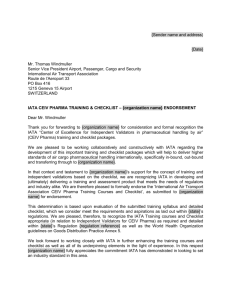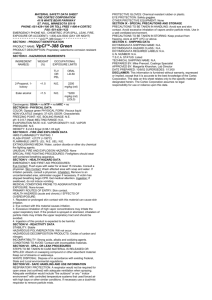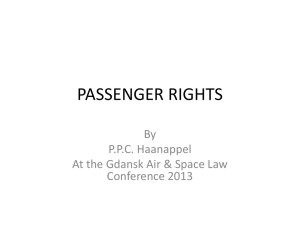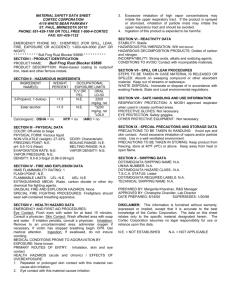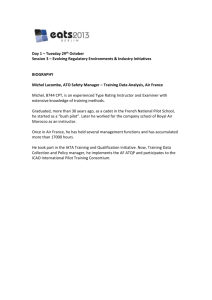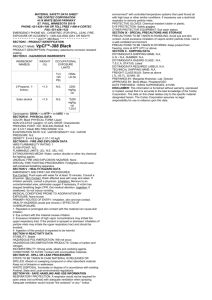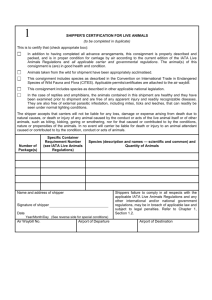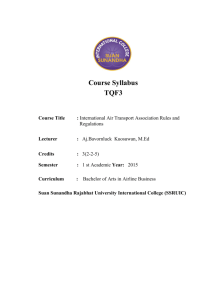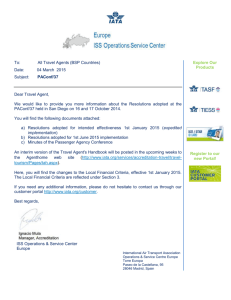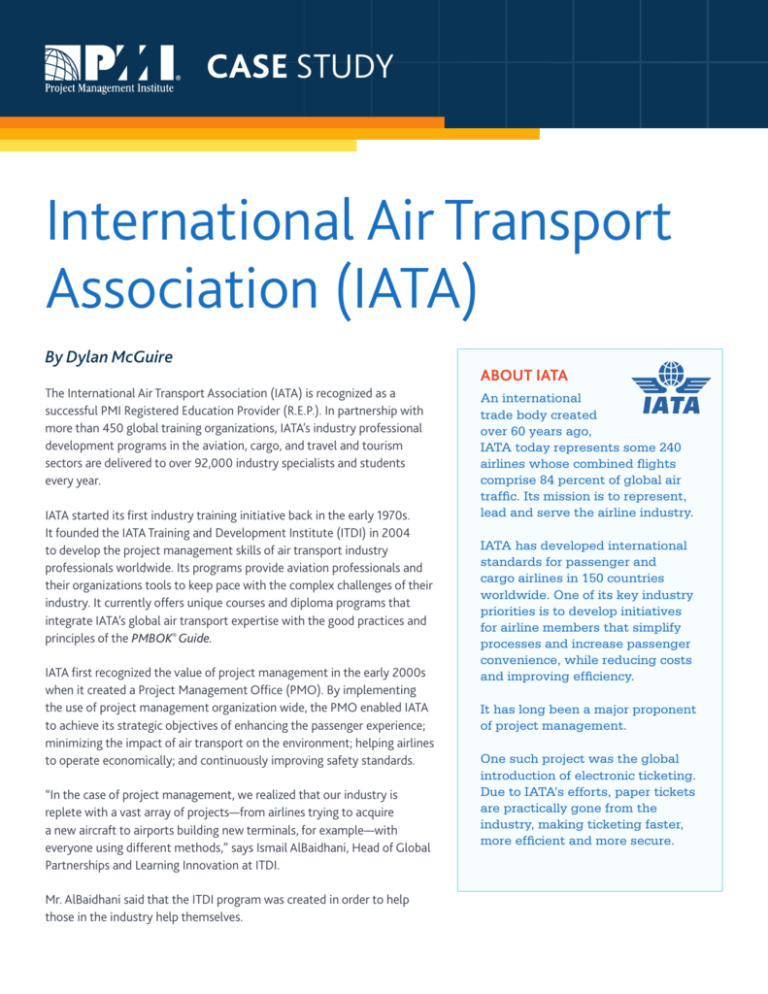
International Air Transport Association (IATA)
May 2014
CASE STUDY
International Air Transport
Association (IATA)
By Dylan McGuire
The International Air Transport Association (IATA) is recognized as a
successful PMI Registered Education Provider (R.E.P.). In partnership with
more than 450 global training organizations, IATA’s industry professional
development programs in the aviation, cargo, and travel and tourism
sectors are delivered to over 92,000 industry specialists and students
every year.
IATA started its first industry training initiative back in the early 1970s.
It founded the IATA Training and Development Institute (ITDI) in 2004
to develop the project management skills of air transport industry
professionals worldwide. Its programs provide aviation professionals and
their organizations tools to keep pace with the complex challenges of their
industry. It currently offers unique courses and diploma programs that
integrate IATA’s global air transport expertise with the good practices and
principles of the PMBOK® Guide.
IATA first recognized the value of project management in the early 2000s
when it created a Project Management Office (PMO). By implementing
the use of project management organization wide, the PMO enabled IATA
to achieve its strategic objectives of enhancing the passenger experience;
minimizing the impact of air transport on the environment; helping airlines
to operate economically; and continuously improving safety standards.
“In the case of project management, we realized that our industry is
replete with a vast array of projects—from airlines trying to acquire
a new aircraft to airports building new terminals, for example—with
everyone using different methods,” says Ismail AlBaidhani, Head of Global
Partnerships and Learning Innovation at ITDI.
Mr. AlBaidhani said that the ITDI program was created in order to help
those in the industry help themselves.
ABOUT IATA
An international
trade body created
over 60 years ago,
IATA today represents some 240
airlines whose combined flights
comprise 84 percent of global air
traffic. Its mission is to represent,
lead and serve the airline industry.
IATA has developed international
standards for passenger and
cargo airlines in 150 countries
worldwide. One of its key industry
priorities is to develop initiatives
for airline members that simplify
processes and increase passenger
convenience, while reducing costs
and improving efficiency.
It has long been a major proponent
of project management.
One such project was the global
introduction of electronic ticketing.
Due to IATA’s efforts, paper tickets
are practically gone from the
industry, making ticketing faster,
more efficient and more secure.
International Air Transport Association (IATA)
May 2014
“As an association of airlines and air transport, we thought that sharing the best methodologies of PMI would be the
best thing to do—and we did it through effective knowledge transfer and efficient training,” adds AlBaidhani.
Those individuals who completed ITDI’s project management training program can earn the IATA Project
Management Diploma. Generally they are existing or new project managers as well as project team members.
However, more advanced project managers and sponsors have also enrolled in the ITDI courses.
“It’s a mix of people really, and from the different aviation value chains” says Mr. AlBaidhani.
The courses are taught by a group of experts with extensive experience in project management in an aviation
context. ITDI applies blended learning methods where attendees can study at any of nine IATA Training Centers or
50 partner locations worldwide. They can also receive in-house company training, that is customized to individual
organizations, at their workplace.
The first course offered as part of the ITDI program was Project Management Essentials, which continues as the
flagship of the program. After its success, IATA launched a program management course, followed by an advanced
project management course. Later, after requests from government and non-governmental organizations, ITDI
launched a contracts and procurement management course.
To date, there are over 700 graduates of IATA’s project management diploma program. Some organizations that have
taken advantage it include: Air Traffic & Navigation Services (ATNS), South Africa; the UN Mission to East Timor;
Vilnius Airport, Lithuania; Kenya Airways, Kenya; and JSC Air Astana, Kazakhstan.
Mr. AlBaidhani says that many organizations have experienced successful project outcomes and impacts due to
their involvement in the ITDI program. For example, he says, starting in 2010, Kenya Airways enrolled a number
of its employees in the IATA project management program—60 of whom earned their IATA diploma. As a result,
the company met its strategic goal of becoming part of the Oneworld Alliance. It also successfully obtained and
integrated new aircraft for its new operations in the United Arab Emirates (UAE).
Kenya Airways also reports that it has used project management to streamline its information systems, thereby
allowing it to deliver projects on time and on budget. It has also applied project management to its route startup and
development engineering initiatives, which have both been successful, the company reports.
Mr. AlBaidhani says that because it is an R.E.P., IATA is now called upon by various key stakeholders around the world
to assist with their aviation projects.
“If an airline or airport is going to launch a major project they usually contact us for training to start with. And we
are able to help them afterwards with other things to help their project team deliver on their project mandate,”
he says. He recommends that other aviation companies consider the PMI R.E.P. program as an important tool for
integrating and recognizing project management methodologies within their organizations in order to meet their
strategic goals.
2
©2014 Project Management Institute, Inc.
International Air Transport Association (IATA)
May 2014
SURVEY SHOWS BENEFITS OF PROJECT MANAGEMENT TRAINING
In 2014, IATA released the results of a survey given to students who participated in
its project management training program. According to those who responded, the
top three most common impacts of the training on their organizations were increased
revenue, followed by reduced cost, and improvement in the industry’s overall health
and regulatory environment.
The survey also reported:
•Roughly half of those who responded said that more than half of their projects were
successful.
•The large majority of respondents said that the IATA project management training
improved the success of their projects.
•Most respondents gave a three out of four when asked to rate how beneficial
their IATA project management training was in fulfilling their current role or
responsibilities.
©2014 Project Management Institute, Inc.
3
Beijing | Bengaluru | Brussels | Buenos Aires | Dubai | Lelystad | Mumbai | New Delhi
Philadelphia | Porto Alegre | Rio de Janeiro | Shenzhen | Singapore | Washington, DC
PMI.org
Project Management Institute
Global Operations Center
14 Campus Blvd
Newtown Square, PA 19073-3299 USA
Tel: +1 610 356 4600 | Fax: +1 610 356 4647
Email: customercare@pmi.org
©2014 Project Management Institute. All rights reserved. “PMI”, the PMI logo, “Making
project management indispensable for business results” and “Pulse of the Profession”
are marks of Project Management Institute, Inc. For a comprehensive list of PMI marks,
contact the PMI legal department. BRA-113-2014 (05-14)
Making project management
indispensable for business results.®

